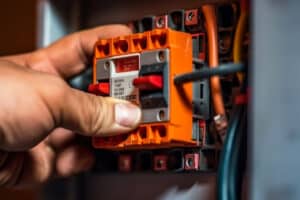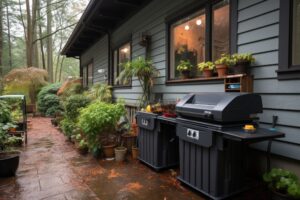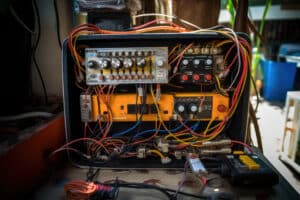What Size Generator is Needed for a Home During Power Outages?
Key Takeaways
- The right generator size is crucial to ensure it can handle the electrical load of your home during power outages.
- Factors to consider when determining generator size include electrical loads and appliances, continuous electric currents, and surge capacities.
- Generac Power Systems’ Home Standby Sizing Calculator can assist in determining the appropriate generator size for your home by considering specific factors and providing generator options and estimated costs.
Power outages can be frustrating, inconvenient, and even dangerous, especially if they last for an extended period. Having a backup generator can provide peace of mind and ensure that essential appliances and systems in your home continue to function during these outages. But what size generator do you need for your house? Let’s explore this question in-depth to help you make an informed decision.
The Importance of Choosing the Right Generator Size
Choosing the right generator size is crucial to ensure that it can handle the electrical load of your home during power outages. An undersized generator may not be able to power all the necessary appliances and could potentially cause damage to the generator or the connected devices. On the other hand, an oversized generator may lead to unnecessary expenses in terms of fuel consumption and upfront costs.
Factors to Consider When Determining Generator Size
Several factors come into play when determining the appropriate generator size for your home during power outages. Let’s take a closer look at these factors:
1. Electrical Loads and Appliances
The first step in determining the generator size is to assess the electrical loads and appliances in your home. Make a list of all the appliances that you consider essential during power outages, such as refrigerators, sump pumps, heating systems, lighting, and communication devices. Note down their running and starting wattage requirements. This information is usually available on the appliance’s label or in the user manual.
2. Continuous Electric Currents
To accurately determine the wattage rating of the generator, you need to measure the continuous electric currents on both lines L1 and L2. Choose the larger current from the two lines as the starting point for calculating the generator size. This ensures that the generator can handle the combined load of all the appliances connected to both lines.
3. Surge Capacities
Some appliances, particularly large motor-driven equipment like central air conditioning units, require higher starting wattage known as surge capacities. Surge capacities account for the initial power spike needed to start these devices. It’s important to consider these surge capacities when calculating the generator size to ensure it can handle the temporary increase in electrical load.
Using Generac Power Systems’ Home Standby Sizing Calculator
One resource that can assist you in determining the appropriate generator size for your home is Generac Power Systems’ Home Standby Sizing Calculator. This online calculator simplifies the process by taking into account various factors specific to your home. Here’s how it works:
1. Input Your Home’s Postal Code and Size
The calculator requires you to input your home’s postal code and size. This information helps determine the average power outage frequency and duration in your area, which can influence the recommended generator size.
2. Select Your Power Needs
Next, you will need to select your power needs by choosing the appliances and systems you want to power during outages. The calculator provides a comprehensive list to choose from, including essentials like lights, refrigeration, heating, and cooling.
3. Receive Generator Options and Estimates
Based on the information provided, the Home Standby Sizing Calculator will generate three possible generator options along with estimated installation costs and financing options. This gives you a clear idea of the available choices and their associated expenses.
4. Schedule a Free In-Home Assessment
If you want a more accurate quote and personalized advice, Generac Power Systems offers a free in-home assessment. During this assessment, a professional from Generac will visit your home to evaluate your specific power needs, assess the installation requirements, and provide tailored recommendations.
Conclusion
Choosing the right generator size for your home during power outages is essential to ensure the smooth operation of essential appliances and systems. By considering factors such as electrical loads, continuous electric currents, and surge capacities, you can make an informed decision. Tools like Generac Power Systems’ Home Standby Sizing Calculator can further simplify the process by providing generator options and estimated costs based on your specific needs and location.
Related Websites:
FAQs:
Q: Why is it important to have a generator during power outages?
Having a generator during power outages ensures continuous power supply, allowing you to keep essential appliances running, stay connected, and maintain a comfortable living environment.
Q: How do watts relate to power consumption?
Watts measure the power consumption of electrical devices. Understanding watts helps you determine the appropriate size of a generator based on the total wattage requirements of your household appliances and electronics.
Q: What factors should I consider when determining the size of a generator?
When determining the size of a generator, consider your average energy usage during power outages, the power requirements of your appliances, and factors like starting wattage, running wattage, potential power surges, climate, and geographical location.
Q: How can I calculate my total wattage needs for a generator?
To calculate your total wattage needs, evaluate the power requirements of your essential devices, add up their wattages, and ensure you select a generator that exceeds this total wattage to avoid overloading.
Q: Should I consult professionals for generator recommendations?
It is advisable to consult professionals or experts who can provide specific recommendations based on your unique circumstances, including potential power surges, climate considerations, and the size and type of your home.






